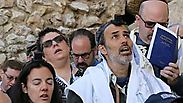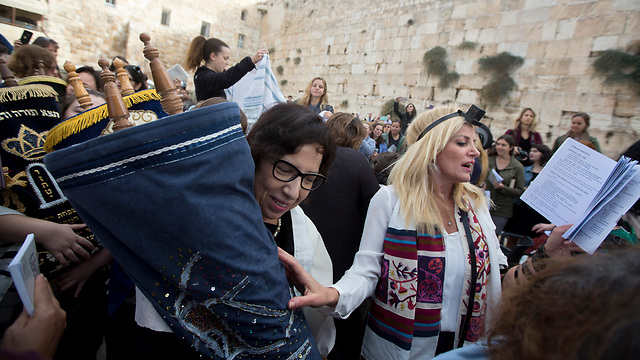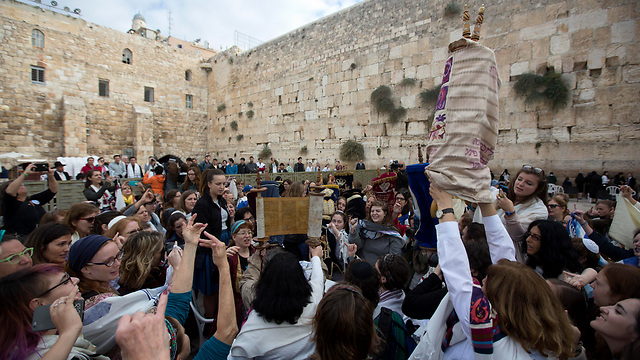
Yesh Atid tries to pass Western Wall plan into law
After Haredi pressure led the government to freeze a plan to recognize an egalitarian mixed-gender prayer area at the Kotel, leading to a crisis with Diaspora Jews, opposition party tries to challenge the coalition by bringing the plan to a vote at the Knesset.
The Yesh Atid party submitted a bill Tuesday proposing to make the now frozen plan for the Western Wall egalitarian prayer area into law.
The plan to officially recognize a special mixed-gender prayer area at the Western Wall was reached in January 2016, after three years of intense negotiations between liberal Israeli and American Jewish groups and Israeli authorities. It was seen at the time as a significant breakthrough in promoting religious pluralism in Israel, where ultra-Orthodox authorities govern almost every facet of Jewish life.
The Western Wall, or Kotel, is the holiest site where Jews can pray, and its main plaza is divided into separate men's and women's prayer sections. Those attempting to hold egalitarian services in the area are often heckled and harassed.
Under the plan, the small egalitarian area would be expanded and receive a more central entrance alongside entrances to the current male and female prayer sites. The area would be managed by representatives of the three main movements in Judaism—Reform, Conservative and Orthodox—rather than just by the Orthodox as the existing prayer areas are.
But the program was never implemented, as powerful ultra-Orthodox members of the coalition government raised objections, leading the government to freeze the plan's implementation on Sunday.
The about face, coupled with another government decision to promote a bill that would enshrine the ultra-Orthodox monopoly over conversions, provoked the ire of liberal Jews, with leaders of the Reform and Conservative movements canceling meetings with Prime Minister Benjamin Netanyahu in protest.
Most American Jews belong to the more liberal Reform and Conservative streams and feel alienated by Israel's ultra-Orthodox authorities, who question their faith and practices.
The harsh reactions from world Jewry caused alarm in the coalition, with Netanyahu and Bennett meeting with US Jewish leaders in an effort to quell the storm. The prime minister even had Cabinet Secretary Tzachi Braverman issue a statement on the matter, which did little to ameliorate the situation.
The bill proposal by Yesh Atid, a party in the opposition, would cause problems for the government, as the issue has never been raised to a vote in the Knesset.
A Knesset vote would challenge Bayit Yehudi leader Naftali Bennett, who also serves as the minister for Diaspora affairs, and Defense Minister Avigdor Lieberman, who said this week he and his party oppose the freezing of the plan.
Mk Benny Begin of the ruling Likud party, who also opposes the decision to freeze the plan's implementation, would also find himself in a pickle, as would MKs Rachel Azaria and Michael Oren from the Kulanu party, also part of the coalition government.
The proposal is unlikely to pass in the Knesset, as the ultra-Orthodox parties Shas and United Torah Judaism are expected to put pressure on the coalition, demanding all members vote against the bill.
Either way, however, the situation is expected to draw attention from world Jewry and keep the issue on the agenda.
Yesh Atid MK Aliza Lavie, who submitted the bill proposal, said Tuesday, "Canceling the plan bluntly slammed the door in the face of world Jewry and caused unprecedented damage to (Israel's) ties with them—going against national interests and the values of Zionism. With this decision, the prime minister dealt a fatal blow to the wholeness and unity of the Jewish people over short-term political considerations, and we must not stand idly by."
"The bill proposal we're promoting reflects the State of Israel's historical obligation to serve as a national home to all Jews, serves out national and security interests, and will help in mending the rift in our relations with Diaspora Jews," she went on to say.
"We believe the great majority of the public's representatives support the proposal (for the egalitarian prayer area), and they are the ones who must make the decision on such a critical issue."












